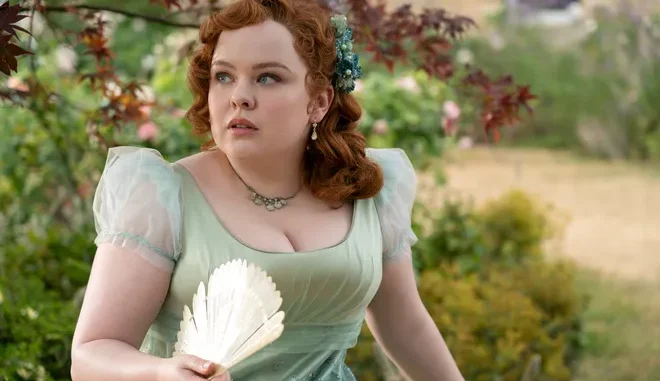
Smell the flowers, drink the lemonade and break out the empire waistlines because “Bridgerton” is finally back.
It’s been two long years since we last visited Regency Britain with its tales of love, gossip and the “marriage mart” (fans got a spinoff, “Queen Charlotte,” last year to tide them over). Season 3 follows the slightly star-crossed love affair between Penelope Featherington (Nicola Coughlan) and Colin Bridgerton (Luke Newton). And just like the other “Bridgerton” seasons and love stories, all the star-crossed parts come from idiocy, self-inflicted and otherwise.
Was it worth the wait for the romance to return? Probably, if you’re more than a casual fan. But three seasons in, it’s clear that “Bridgerton” will never recreate the magic of its first, which had all the right amounts of love, sex, intrigue, duels, honor and shirtless men to create a phenomenon when it premiered in December 2020.
Season 2 was fine, and Season 3 (now streaming, ★★★ out of four) is better. It’s funnier, the sex is more frequent (if not hotter), and it makes Coughlan a bona fide star. The new episodes (four now streaming, four more due June 13) are beautiful, smart and charming. If the series is not transcendent, that’s OK. “Bridgerton” suffers by comparison to itself, but it’s not the end of the world. Or of the “season,” as Lady Whistledown would say.
Our third bout with the “ton,” as the aristocracy calls itself, sees a new couple taking the spotlight. Technically it’s Colin Bridgerton’s year since he is the member of the titular family falling in love. But the season belongs to Coughlan’s Penelope, the youngest and most overlooked Featherington sister. Penelope has used her wallflower status at every ball and promenade to create a business writing a successful gossip rag under the pseudonym Lady Whistledown (narrated by Julie Andrews), passing judgment on her subjects and angering and intriguing the Queen (Golda Rosheuvel). But it’s getting harder to stay anonymous; Penelope’s best friend Eloise Bridgerton (Claudia Jessie) ended their friendship in Season 2 when she found out about Penelope’s side hustle.
In Season 3, Penelope turns her attention to her own marriage prospects for the first time, giving up the longstanding crush she’s had on Colin and trying desperately to get out of her mother’s house. But it turns out Penelope wasn’t just overlooked because of the garish dresses her mother made her wear. She’s also awkward and nervous at parties, prone to turn off potential suitors rather than entice them. It’s here Colin swoops in to save the day, offering her “Pygmalion”-style lessons in a charm offensive. He does so because he’s desperate to maintain their friendship after he once turned her off by insulting her. But will he discover he wants to be more than friends? And what will he do if he finds out she’s Whistledown?

“Bridgerton” is based on a series of romance novels by Julia Quinn, so it’s not hard to figure out what will happen to Penelope and Colin. But the skill in this genre is titillating and intriguing the audience along the way to happily ever after. The burden of that task falls squarely on Coughlan, and she carries the season in her delicately gloved hands, even getting her own “She’s All That”-style stairway entrance after she gives herself a makeover (take that, Freddie Prinze Jr.).
She succeeds, unfortunately, without much help from the wooden Newton. Coughlan is immensely talented – that’s been obvious since her turn in Netflix’s aggressively delightful Northern Ireland series “Derry Girls” – but the poor woman shouldn’t have to be working this hard. Newton may have a good smoldering look, but in most scenes, he gives her absolutely nothing. Less than nothing. Coughlan may as well be putting on a one-woman show, but I’d still buy a ticket.
If Season 2 was a bit of a wet blanket (or wet frilly men’s shirt) for fans of the steamier scenes, Season 3 immediately tries to course correct by loading up the sex and nudity. But new executive producer Jess Brownell and the writers seem to come from the “Game of Thrones” school of “any sex makes a scene better,” without thinking too hard about what makes sex compelling in a drama. There are too many half-naked prostitutes and not enough romantic tension-building. By Episode 4, though, the lust and love all start to coalesce into something with sparks. It’s enough to forgive more than one brothel threesome scene. Almost.
Some secondary plots in the season are less compelling. Sixth Bridgerton sibling Francesca (Hannah Dodd) makes her debut on the social scene, although she’d rather play piano than attend a ball. Boxer Will Mondrich (Martins Imhangbe) and his wife Alice (Emma Naomi) get a surprising ticket into high society and a crash course on manners. And Bridgerton matriarch Lady Violet (Ruth Gemmell) may get her own second chance at love.
As sweet as Francesca’s story ends, it has so many echoes of Daphne’s (Phoebe Dynevor) from Season 1 that it feels like a rehash rather than something new. Perhaps that’s why the producers decided to slot the story in this year rather than giving Francesca her own future season. In early episodes, the Mondriches are the most interesting side characters, but they are not fully explored. Violet, too, could use more depth and screen time to explore who she is outside of her children.
But it all inevitably comes back to Penelope and Colin. If you’re not rooting for them, there’s no point in watching. Colin has been rather bland in the first two seasons, and regretfully Newton’s performance hasn’t done much to give him life. But through sheer will and a lot of meaningful glances, Coughlan makes Penelope and Colin worth your emotional investment.
After all, Lady Whistledown should have her own romance worth gossiping about.
